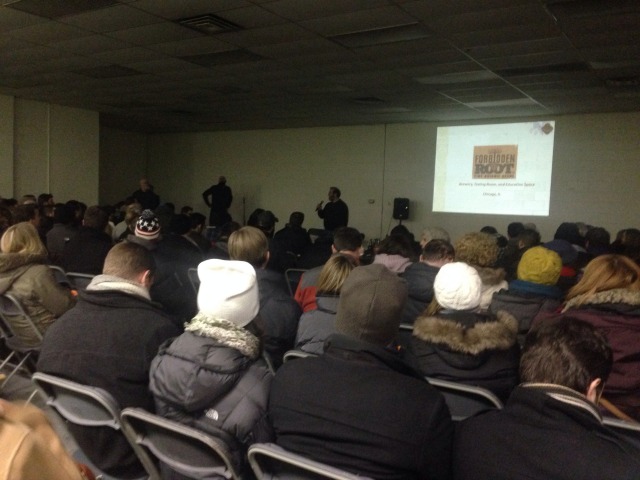Crowds Show Up To Support Forbidden Root’s Brewery Proposal
By Staff in Food on Jan 24, 2014 8:50PM

(Photo credit: Melissa McEwen)
A crowd of around 300 people gathered at the site of the old Hub Theater last night to learn about Forbidden Root’s proposal to change the zoning and lift the liquor moratorium in the area.
“Radical Brewing” guru Randy Mosher spoke first, praising Forbidden Root’s innovative brewing style, which is inspired by ancient practices that drew on roots, herbs and fruits.
Operations Manager and brewer BJ Pichman then took the floor to talk about their plans to restore the building, which has been almost entirely vacant since 1990. An unslightly drop ceiling currently covers the open-span ceiling, but they plan on removing that to bring back the original theatrical look of the building.
Their brewing capacity will be small -- 10-barrels that are mainly for taproom use. They will do their bigger brewing projects and bottling off site. Bottles, and their planned line of bitters, will be available in a greenhouse-style store. There will be 5 full-time employees and 10 part-time employees.
Founder Robert Finkel told the room about his vision for charitable giving, which led him to make Forbidden Root a “Benefit Corporation,” an emergent concept that involves considerations of benefits to society and the environment in corporate decision-making. Their current beneficiary for charitable contributions is The Green City Market.
Pichman also said they are going to collaborate with local producers and chefs to build a small food menu, though they aren't planning on a full kitchen.
But all this is only if they can get the laws changed. The area’s liquor moratorium and current zoning rules are currently incompatible with their business plan. The liquor moratorium is a contentious issue for local community groups, because local Alderman Proco Joe Moreno promised The East Village Association that he wouldn’t lift it until 2015.
But the moratorium has a loophole. Alcohol sales are allowed if they are “incidental” to another business. The list of these types of businesses includes hotels, restaurants, and banquet halls, but not breweries. They could open a restaurant, but since they are a brewery it would be a tenuous legal situation, as most of their revenue would have to come from food to qualify for the incidental exemption.
Rolando Acosta, the zoning attorney representing Forbidden Root and the building’s owners, said they are attempting to change the law to include breweries. They should know around March if this will work.
He also addressed the common concern The East Village Association has brought up, such as another business using the re-zoning to open up a type of business the neighborhood would be unhappy with, such as a dry cleaning plant or a more rowdy type of tavern. They plan on using a method of conditional re-zoning that would only allow brewpubs to take advantage of the new zoning and the precedent it sets. They also plan on having an operations plan that specifies hours attached to their liquor license. At one point they asked the room whether anyone had ever witnessed a fight at a brewpub. No one raised their hand.
Judging by crowd reactions, it seemed most people were there to show support. But a few neighbors showed up to ask skeptical questions. One neighbor said she was worried about a “yeasty” odor and another voiced concern about mechanical noise, parking and “more activity” on the street. Representatives from Pipeworks Brewing Company were in attendance and said that even though their operations is right in the midst of condos in Bucktown and is a larger brewery than the planned Forbidden Roots operation, they’ve never received a complaint.
A few people suggested they try a different building in a nearby area with fewer legal restrictions, but Pichman said that they have fallen in love with the neighborhood and this specific building, which the city considers a landmark building.
Many people who asked questions said they previously had doubts, but felt supportive after their concerns had been addressed. One attendee urged his neighbors to consider becoming more involved in local politics by joining local neighborhood associations like The East Village Association, because its positions depend on the membership. Acosta said supporters should also consider emailing Alderman Proco Joe Moreno to voice their support.
Members of The West Town Chamber of Commerce collected a survey from attendees at the end of the night that asked whether or not they supported the legal changes, and plan to communicate the results to the Alderman.
Previously: Forbidden Root's Fight Against Local Liquor Laws
By Melissa McEwen